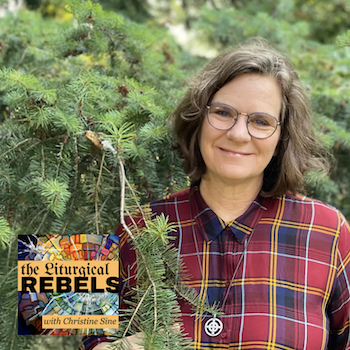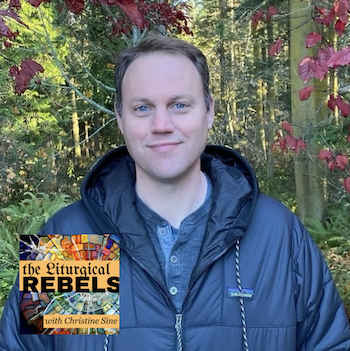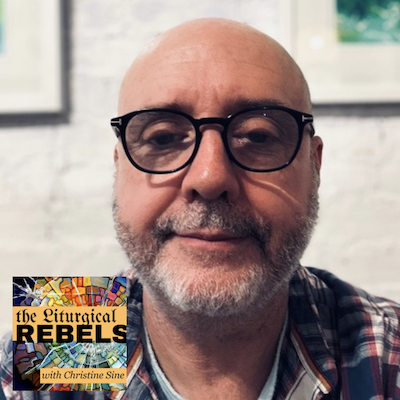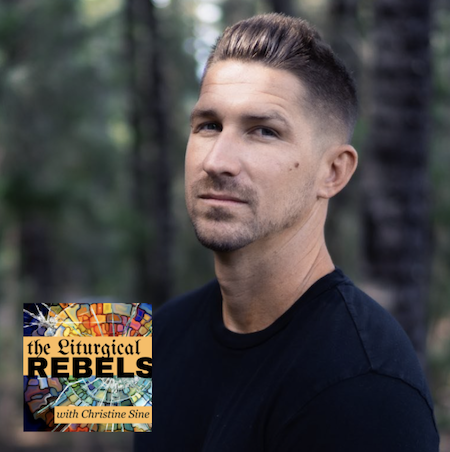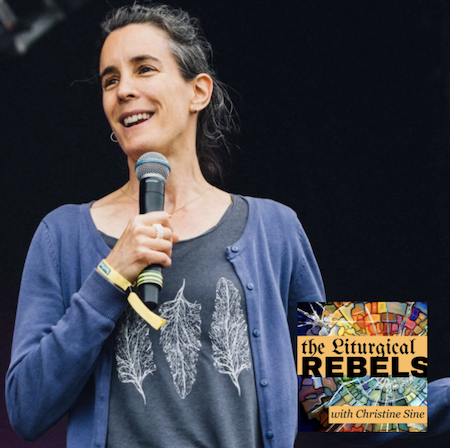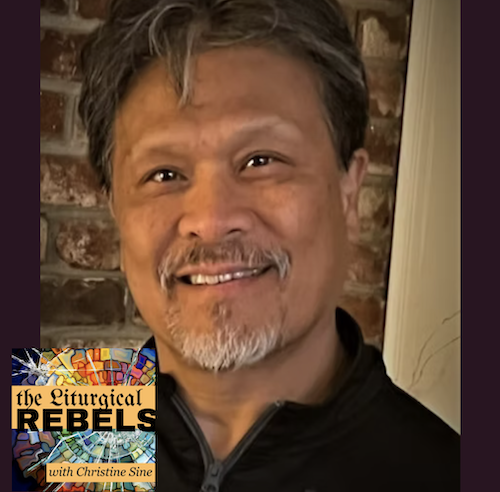In this conversation, Christine Sine and Victoria Loorz explore the intersection of faith and ecology, discussing Victoria’s journey from a corporate career to becoming a leader in the Wild Church movement. They delve into the importance of connecting spirituality with nature, the emergence of the Wild Church Network, and the significance of sacred conversations with the natural world. Victoria shares insights from her work with the Seminary of the Wild, emphasizing the need for intentional practices to foster a deeper relationship with the earth and each other. This conversation explores the deep connections between nature, spirituality, and community and addresses the importance of rewilding both the land and the soul. Victoria and Christine emphasize the need for storytelling in fostering a deeper relationship with the natural world. The dialogue highlights the interconnectedness of health, biodiversity, and spirituality, advocating for a holistic approach to living in harmony with nature. The concept of a ‘wild God’ is introduced as a call to action for individuals to engage more fully in the miraculous dance of life, ultimately leading to a rewilding of the church and spiritual practices.
Takeaways
- Victoria Loorz emphasizes the importance of connecting faith with nature and the spiritual implications of climate change.
- The Wild Church Network was founded to create a space for worship in nature, recognizing the earth’s inherent holiness.
- Sacred conversations with nature are deeply important.
- The Field Guide to Church of the Wild serves as a resource for those looking to start their own gatherings in nature.
- The practice of wandering in nature allows individuals to connect with the divine and their surroundings.
- Community and shared experiences are crucial for understanding spirituality.
- The Seminary of the Wild focuses on deepening relationships with the natural world and fostering conversations with it.
- Victoria discusses the concept of sacred reciprocity and how it relates to our connection with nature.
- Intentional practices are necessary to reconnect with the earth and each other.
- Storytelling and community engagement are crucial for successful rewilding efforts.
- Rewilding involves restoring both land and spiritual practices.
- A healthy ecosystem reflects the importance of diversity.
- The concept of a ‘wild God’ encourages deeper participation in life.
- Unlearning disconnection is a vital part of spiritual development.
Victoria Loorz, MDiv, is a wild church pastor, an eco-spiritual director and co-founder of several transformation-focused organizations focused on the integration of nature and spirituality. After twenty years as a pastor of indoor churches, she launched the first Church of the Wild, in Ojai CA and began to meet others with the same sense of call to leave building and expand the Beloved Community beyond our own species. She then co-founded the ecumenical Wild Church Network.
Victoria is co-founder and director of Seminary of the Wild, which is focused on a deep-dive yearlong Eco-Ministry Certificate program for all those who feel called by Earth and Spirit to “restore the great conversation.” (Thomas Berry) She has two books about Wild Church – Church of the Wild and Field Guide to Church of the Wild.
Victoria Loorz can be found on her website: https://www.victorialoorz.com
In this conversation, Christine Sine and her husband, Tom Sine, interview James Amadon about the evolution of Circlewood, an ecological ministry on Camano Island, and the journey that led James to take on leadership. They explore the integration of ecology and faith, the history of the land, and the vision for future development, including educational programs and community partnerships. The dialogue emphasizes the importance of hope and the need for new paradigms in pastoral leadership to address ecological challenges.
Takeaways
- A new paradigm of pastoral leadership is needed to address ecological crises.
- Circlewood aims to create spaces for transformative experiences.
- Celtic spirituality and ecological awareness are foundational to Circlewood’s work.
- Educational programs are being developed to foster ecological discipleship.
- Partnerships with local organizations enhance community engagement.
- The work of Circlewood is about serving the common good.
- Hope is essential in navigating the challenges of our time.
James Amadon was raised in the Great North Woods of New Hampshire, but has called the Pacific Northwest home since 2007. His desire to integrate faith and ecology led him to start Circlewood in 2017. As the Executive Director of Circlewood, James guides the mission to “accelerate the greening of faith” through creative and global media, including the Earthkeepers podcast and The Ecological Disciple online journal, immersive education like The Journey of Ecological Discipleship leadership cohort, and the development of Circlewood Village, a sustainable learning center on Camano Island. James is ordained in the Covenant Church, and pastored in churches for 15 years. He has a BA from Gordon College, an MDiv from North Park Theological Seminary, and a DMin from Duke Divinity School, where he focused his work on developing a framework for Ecological Christian Leadership (ECL).
James can be found at:
In this conversation, Ian Mobsby shares his transformative journey from a liberal atheist background to embracing the Christian faith. He discusses his involvement in alternative worship and missional communities, emphasizing the importance of building relationships and fostering spiritual journeys. The conversation delves into the rise of contemplative spirituality, highlighting its appeal to both churchgoers and those outside the faith. Ian presents a contemplative approach to mission, focusing on God’s work of restoration rather than human manipulation. The cyclical nature of spiritual growth and the transformative power of the contemplative tradition in Christianity is explored. They delve into the concept of being ‘spiritual but not religious’ and the need for a shift from traditional hierarchical models of church leadership to a more community-oriented approach.
Ian can be found at
- Personal Website: https://www.ianmobsby.net
- Facebook: https://www.facebook.com/ian.mobsby
- Substack: https://postsecularcontemplative.substack.com
- BlueSky: https://bsky.app/profile/ianjmobsby.bsky.social
- Linked In: https://www.linkedin.com/in/ian-mobsby-8ab7a3b/
In this episode of the Liturgical Rebels podcast, Kevin Sweeney shares his transformative journey from a conservative Christian background to a more progressive and radical perspective. He discusses the significance of the Black prophetic tradition in shaping his faith and the importance of understanding the Cosmic Christ as a universal force. The conversation also delves into the role of the Concrete Jesus in calling believers to action and the limitations of traditional creeds in addressing love, justice, and liberation. In this conversation, Christine Sine and Kevin explore the significance of embodiment in faith, the limitations of creeds, the transformative power of mysticism, and the practical implications of living out spiritual principles. They discuss how the creeds can create a disconnect between belief and action, and how the teachings of the mystics can guide individuals towards a more experiential understanding of God. The conversation emphasizes the importance of love, community, and personal transformation in the journey of faith.
Takeaways
- Kevin’s graduation moment symbolized a challenge to institutionalized white supremacy.
- The Black prophetic tradition profoundly shaped Kevin’s Christian imagination.
- Experiencing God can happen outside traditional church settings.
- The Cosmic Christ represents a universal force present in all creation.
- Creation itself is seen as the first incarnation of Christ.
- The Concrete Jesus emphasizes action and involvement in the world.
- Faith should be about transformation and direct experience with God. The creeds focus on beliefs but neglect embodiment.
- Abstract beliefs can lead to a disconnect from action.
- Mystics offer a deeper, experiential understanding of God.
- Being seen by God liberates us from seeking validation from others.
- The cosmic Christ invites us to trust in a loving reality.
- Personal transformation is rooted in direct experiences of God.
- Community and love are central to the Christian journey.
Kevin Sweeney was co-founder and lead pastor of Imagine Church for almost ten years. Imagine was an urban church in Honolulu that was welcoming of all people and committed to leading the church into the future. Kevin was co-founder of the Honolulu based creative collective The (un)Commons, spoke at Hawai’i Contemporary’s premier art Biennial, and helped lead “Saying Grace,” a curated gathering of dinners and stories between the church and the LGBTQ community in Honolulu. After receiving Masters Degrees in Theology and Intercultural Studies (with a focus on Black and Womanist theology) Kevin is fascinated with and committed to creating environments for creativity, cultural innovation, social healing, communal cohesiveness, and personal transformation.
Kevin is the host of podcast “The Church Needs Therapy” and is a best selling author. His three books are “The Cosmic Christ and the Concrete Jesus”, “The Making of a Mystic: My Journey with Mushrooms, My Life as a Pastor, and Why It’s Okay For Everyone to Relax,” and “The Joy of Letting Go.” He currently lives and surfs in Honolulu with his wife and co-founder of Imagine, Christine, and their two kids, True and Mikayla.
You can connect with Kevin Sweeney at his website www.kevinsweeneynow.com or on Instagram
As an Amazon Associate I receive a small amount for purchases made through appropriate links. Thank you for supporting Godspace in this way.
In this conversation, Christine Sine and Forrest Inslee engage with Ruth Valerio, exploring her journey into Earth care and the integration of faith with environmentalism. Ruth shares her personal experiences and theological insights, emphasizing the interconnectedness of social justice and environmental issues. The discussion highlights the importance of simplicity in living, the role of the church in advocating for Earth care, and the need for individual action in addressing the climate crisis.
Ruth Valerio has a vision to inspire and equip people to a whole-life response to environmental breakdown and poverty, helping build a movement that brings about lasting change on the issues that impact the poorest and most vulnerable, and that creates a flourishing natural world. She is Programmes, Partnerships and Advocacy Director for Embrace the Middle East – an organisation that works to support Middle East Christians as they tackle poverty and injustice in vulnerable and marginalised communities.
She has a theology degree from Cambridge and a doctorate from Kings College London and holds honorary doctorates from the Universities of Winchester and Chichester and is Canon Theologian at Rochester Cathedral. She has written extensively on justice, environment and lifestyle issues. See her Publications pages for more information. Her Christian faith and spirituality are central to her life, and from this bedrock comes a deep desire to work for social justice, equality and ecological flourishing.
You can contact and learn more about Ruth Valerio at ruthvalerio.net
More about Forrest Inslee including contact information can be found at his website www.circlewood.online
Find out more about Christine Sine on
Walking In Wonder on Substack
and on her website Godspacelight
And on social media:
Instagram
Facebook
X
In this engaging conversation, Christine Sine and Al Tizon explore the complexities of identity, faith, and social justice. Al shares his experiences as a third culture kid and his transformative journey back to the Philippines as a missionary. They discuss the challenges of integrating theology with activism, the impact of classism, and the importance of solidarity with the marginalized. Al introduces six movements that can help individuals and communities live out the gospel in practical ways, emphasizing the need to confront comfort and embrace a life of service. The conversation concludes with reflections on the true essence of the Christian life and the call to prioritize God’s project over personal comfort.
Takeaways
- The term ‘third culture kid’ describes a unique identity shaped by multiple cultures.
- Returning to the Philippines was a transformative experience for Al Tizon.
- Classism is a significant issue that infiltrates and affects the church and society.
- The six movements towards solidarity can guide individuals in their faith journey.
- Community engagement is essential for living out the gospel.
- Comfort can often hinder true engagement.
- The church must respond to current social challenges with compassion and action.
- Life in Christ offers a richer fulfillment than the pursuit of comfort.
Rev. Dr. Al Tizon is lead pastor of Grace Fellowship Community Church in San Francisco, CA and affiliate professor of missional and global leadership at North Park Theological Seminary in Chicago, IL.
Al has engaged in community development, church leadership, advocacy, and urban ministry in the United States and in the Philippines. Previous positions he has held include executive minister of Serve Globally, the international ministries of the Evangelical Covenant Church denomination; holistic ministry director and then president of Christians for Social Action and associate professor of holistic ministry at Palmer Theological Seminary of Eastern University near Philadelphia, PA.
Al is the author or editor of seven books, including Whole & Reconciled: Gospel, Church, and Mission in a Fractured World (Baker Academic, 2018) and Christ Among the Classes: The Rich, the Poor, and the Mission of the Church (Orbis, 2023). Al received his BA in religious studies (1984) and his MA in church leadership studies (1987) from Vanguard University of Southern California (Costa Mesa, CA). He received his PhD in missiology from the Graduate Theological Union (2005, Berkeley, CA). Al is an ordained minister of the Evangelical Covenant Church.
Al and his wife Janice live in the San Francisco Bay Area, in close proximity to their four grown children and seven grandchildren.
You can learn more and contact Al on his website.
In this conversation, Christine Sine and Ruth discuss the intersection of theology, gender, and social justice. Ruth shares her personal history growing up in Argentina during a military dictatorship, which shaped her passion for peace and justice. They explore the challenges faced by women in theology, the importance of community living, and the role of environmental stewardship. The conversation also touches on the impact of political decisions on migration and refugee support, and concludes with a discussion on maintaining hope in chaotic times.
Takeaways
- Ruth’s personal history in Argentina shaped her passion for justice.
- The importance of community support for women in theology.
- Navigating gender issues in theological education is challenging.
- Intentional communities can foster hope and resilience.
- Environmental stewardship is a vital aspect of community life.
- Political decisions significantly impact migration and refugee support.
- God’s intent is for the flourishing of all creation.
- Hope can be nourished through community engagement.
- Theological work should reflect embodied commitments.
- Living out faith involves seeking justice and God’s reign.
Ruth yearns to see peace and justice embrace in the beautiful and broken world we call home. A wife of one and mother of many, theologian, missiologist, educator, and storyteller, she has been involved in leadership development and theological education for integral mission in her native Latin America for several decades. She teaches at Western Theological Seminary (https://www.westernsem.edu) land serves with the Comunidad de Estudios Teológicos Interdisciplinarios (CETI – www.ceticontinental.org, a learning community with students across Latin America), and with INFEMIT (International Fellowship for Mission as Transformation –www.infemit.org). She serves on the board of the Oxford Centre for Mission Studies and the American Society of Missiology. She lives with her husband, James, in Costa Rica as a member of Casa Adobe, an intentional Christian Community with deep concern for right living in relation to the whole of creation(www.casaadobe.org). Her studies include a Bachelors in Education (Argentina), an MA in Interdisciplinary Studies (Wheaton College), and a PhD in Theology (Boston University).
As an Amazon Associate, I receive a small amount for purchases made through appropriate links.
Thank you for supporting Godspace in this way.
When referencing or quoting Godspace Light, please be sure to include the Author (Christine Sine unless otherwise noted), the Title of the article or resource, the Source link where appropriate, and ©Godspacelight.com. Thank you!

